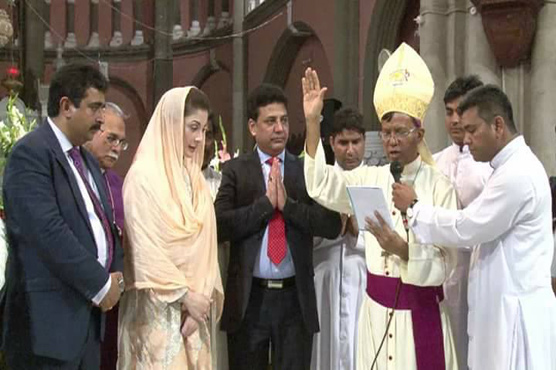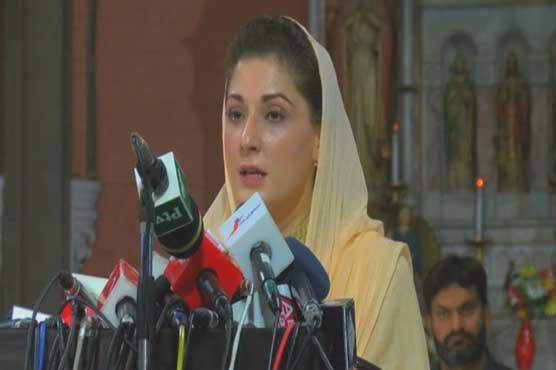The Church, Politics and Pakistan

This incident shows that minorities in Pakistan do not yet know how to engage with political parties. Photo: Dunya Images
By Yaqoob Khan Bangash
On September 1, 2017 an incident took place in Lahore which has no precedence in recent memory in Pakistan. On that day Ms Maryam Nawaz Sharif, the daughter of the recently removed Prime Minister, Nawaz Sharif, and of the candidate in the NA 120 by election, Begum Kulsoom Nawaz, went to the Sacred Heart Cathedral Lahore for prayers for her mother who had been taken gravely ill recently. What should have been a simple prayer for a sick person turned into a huge fiasco which blew up over social media almost immediately.
So what happened?
What happened was that Ms Maryam Nawaz, and the Federal Minister for Statistics, Mr Kamram Michael, and the Punjab Minister for Minorities Khalil Sandhu, sat with the Archbishop of Lahore and the Bishop of Raiwind on top of the sanctuary in the church. Then Ms Maryam Nawaz went up the pulpit and rather than just thanking the Church for its prayers, gave a rather politically charged speech. While some people saw this as a sign of ‘mainstreaming’ the church, others saw it as mixing religion and politics, and showing the Catholic Church in a party political stance.
The furore over the event was such that the Archdiocese of Lahore had to issue a statement on September 3, distancing themselves from the speech and apologising for the event. No statement has yet been released from Ms Maryam Nawaz’s office.
So why all the fuss?
The fuss was created because the Archdiocese of Lahore broke with long standing tradition and law of the church in allowing a political event on church premises. Rather than sitting with the people, Ms Maryam Nawaz sat where priests and bishops sit—a place restricted by church law to church functionaries only. Furthermore, Ms Maryam Nawaz addressed the people from the pulpit—again a platform reserved for the clergy, rather than speaking outside the church to the press etc. And lastly, she gave a political speech.

Maryam Nawaz addressing the Christian community. Photo: Dunya Images
Now the Christian Church, especially the Catholic Church, has always been political. Since it has the care of souls, it has particular views on the world’s political, moral and social problems, in addition to its religious role. For example, Pope Francis was one of the first world leaders to publically condemn the Rohingya massacres in Burma. In the olden days, the church used to be politically aligned, with official endorsements of monarchs, and even political parties. However, beginning in the twentieth century the church began to disassociate itself from political parties and began to focus on issues. The aim was to focus on fostering the common good rather than picking sides. So it did not matter which political party its members supported, as long as its members were cognizant of issues relating to faith and morals in political affairs.
Thus, in the United States while the church remains strictly neutral it is largely perceived that it is closer to the Republicans rather than the Democrats because of a strong pro-life stance of most Republicans as compared to Democrats. But despite this perception, and perhaps even reality, no church leader in the US would even imagine to give a politician the pulpit or allow them to sit wit them on the altar.
The reason why the September 1 incident happened is simple. Both sides had never done it and did not know what to do exactly. Ms Maryam had never spoken in a church and did not know what to say or not to say, and the Archbishop had never had a request from a senior politician for a prayer service. The Church authorities perhaps wanted to please an important leader and the political side did not want to lose an opportunity for winning votes. If advisers on both sides had done their job it would have been a win-win for both sides: Maryam could have come to the church, sat in a pew, had prayers for her mother said, and then addressed the press and others, with the Archbishop on her side even, outside the steps of the church. No sentiments would have been hurt, no church laws, broken, no partiality shown in this way. But this course was not adopted.
Why is this incident important?
This incident shows that minorities in Pakistan do not yet know how to engage with political parties. There are ‘minority wings’ in most major parties but they are nothing more than a joke. There are token minority ministers, but they hardly represent anyone or even do the job assigned to them. The church too has remained largely apolitical. And so when such an occasion arises both sides have no clue how to handle it.
This event should help us ponder on two issues: first, that non-Muslims, Christians in this case, are a political community and the mainstream must engage with them. In the Punjab alone Christians can affect over a dozen national assembly seats and twice as many provincial assembly seats. The reality is that Maryam Nawaz went to Sacred Heart Cathedral was both for her mother’s health as well as for the Christian vote in NA 120. Hence, there needs to be constructive engagement with this community, which should not be random and piecemeal visits to churches, but concerted efforts to eliminate barriers, increase opportunity and create confidence in the community.
Secondly, the Christian Church needs to realise that it does need to play a role in the public life of its members. With the largely uneducated, working class, and downtrodden community, the responsibility of the church is even greater. Hence, church leaders need to realise how they can promote the interests of their community without jeopardising their politically neutral role. When I was at Oxford, our local parish priest used to arrange hustings for the local parliamentary seat where members of the church would come and ask questions from the candidates for the seat. The parish therefore opened the space for political dialogue, (it was held in a hall, not the church), and yet remained neutral in terms of political parties. With the elections coming up the church leaders should think of these and others similar activities so that their flock should form part of the evolving national discourse and not remain idle bystanders.
This incident has given us an opportunity to enrich the political landscape of the country, increase dialogue and participation, and make democracy in the country stronger—let us not lose this opportunity.
The author is an academic based in Lahore. He can be contacted at: yaqoob.bangash@gmail.com


